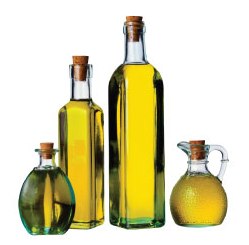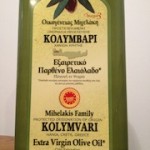 It seems that there’s always breaking news about some new hot-topic healthy fat that everyone should be eating. But then a month later, it seems like new research has come out discrediting previous health benefits, and the world moves on to the next “cool” thing. So what’s really going on with healthy fats? How can fat be healthy, and how is it not?
It seems that there’s always breaking news about some new hot-topic healthy fat that everyone should be eating. But then a month later, it seems like new research has come out discrediting previous health benefits, and the world moves on to the next “cool” thing. So what’s really going on with healthy fats? How can fat be healthy, and how is it not?
Below are some of our favorite oils and the health benefits associated with each:
Olive Oil
Olive oil naturally contains a high amount of monounsaturated fatty acids; in fact, it has the largest amount of monounsaturated fatty acids of all naturally produced oils. These monounsaturated acids protect against heart disease by reducing LDL (“bad”) cholesterol levels and raising HDL (“good”) cholesterol levels. Other suggested benefits of olive oil include that it may have beneficial effects on ulcers and preventative actions against colon cancer.
What about the different types of olive oil? Extra virgin olive oil is the least processed, as it comes from the first cold-pressing of the olives. Virgin olive oil is from the second pressing of the olives. Other varieties, including pure and extra light olive oil, are more processed, but are also more heat-stable for cooking.
* Try The Olive Oil Store…they sell very good quality olive oil and balsamic vinegars, both plain and infused with a variety of flavors. If in Jacksonville, the Olive Oil Store is located in the St John’s Town Center.

Kolympari Olive Oil – Now, if you do not have an Olive Oil Store nearby, you can try to locate this brand: Kolympari Olive Oil, which is typically sold at finer gourmet stores, but is excellent quality extra virgin olive oil and tastes amazing. Kolympari Olive Oil is imported from Greece, where it remains a family owned and operated business. It is expensive, I paid $45 for the tin pictured here and I buy it from Wine Warehouse in Atlantic Beach, but it tastes amazing. I never cook with this oil, only using it on salads, other raw vegetables or drizzle a little on top of already cooked food for extra flavor.
Flaxseed Oil
Flaxseeds are the richest plant source of omega-3 fatty acids; thus flaxseed oil also contains many of these heart-healthy omega-3 fatty acids. Alpha-linolenic acid, a type of omega-3 fatty acid, is currently being researched for its possible benefits with reducing strokes, certain cancers, and skin problems. Flaxseed oil also contains omega-6 fatty acids. Both of these fatty acids are polyunsaturated and are important for normal growth and development. On top of these healthy fatty acids, flaxseed oil also contains protein, potassium, and beta-carotene.
If you choose to use flaxseed oil, only use it in cold applications, like in homemade salad dressings. Because it stands up so poorly to heat, almost all of the health benefits in flaxseed oil are negated if it’s heated. Also, be sure to store it in the refrigerator when not in use.
Nut Oils
Just like there are many health benefits in nuts, nut oils contain many similar health benefits, including being low in saturated fats. Other benefits of specific nuts include high sources of monounsaturated fats in almond, hazelnut, macadamia, pecan, and pistachio oils; a source of polyunsaturated fats and omega-3 fatty acids in walnut oil; and significant sources of vitamin E in almond and hazelnut oils.
Nut oils can be used in a variety of ways, including in baking (try hazelnut oil), stir fries (peanut oil is a great traditional oil), or on salads or vegetables (like almond oil).
Avocado Oil
With health benefits similar to olive oil, avocado oil makes a great olive oil alternative. The good thing about avocado oil is that it has a higher smoke-point than olive oil, particularly the virgin and extra virgin olive oils. This means that the oil can withstand a higher heat before losing its health benefits, so if you want to make a stir fry or roast some vegetables, avocado oil may be a better choice than olive oil. Or, you could just leave the avocado oil plain on some salad to truly absorb the delicious flavor.
Sesame Seed Oil
This oil has become trendy as a “flavor” oil, as a little goes a long way in kicking up the flavor profile in Asian cuisine. It has a high polyunsaturated fat content, and is also very high in antioxidants, which can help prevent heat oxidation. To gain the best benefits in terms of flavor enhancing and health, try drizzling a small amount of toasted sesame seed oil over your dish after it’s finished cooking.
Coconut Oil
Coconut oil has become a very trendy oil. The theory behind coconut oil is that, although it is a saturated fat, it is predominantly made up of medium-chain triglycerides, which are a shorter fatty acid chain that can be digested and absorbed more easily. Coconut oil also contains vitamin E, K, and iron, all of which are retained when cooking at a high heat. However, coconut oil is still a saturated fat, and the research isn’t all there to back up the claims, yet. If you want to try coconut oil, feel free, but (as with all fats), use sparingly and use in ways that you can truly enjoy the slightly tropical flavor.
Hemp Oil
Hemp oil is an unrefined oil that is very high in omega-3 fatty acids. It also contains GLA, which is the only omega-6 that has anti-inflammatory properties. These health benefits make hemp oil a great choice, but like many of these oils, be careful of high heat; this oil works better in cooler applications, like salad dressings. Beware, though, as some think hemp oil has a slightly “earthy” taste that may take a little getting used to!
Grapeseed Oil
Grapeseed oil has health benefits that can purportedly fight cancers and lower the “bad” LDL cholesterol. It has a very clean, light taste, and a very high polyunsaturated fat content. Additionally, good quality grapeseed oil can offer a higher antioxidant profile. The other great thing about grapeseed oil is that it’s tolerant to moderately-high heats, so you can use it in stir fries and up to 425 degrees without losing any health benefits.
Keep In Mind…
Regardless of which type of oil you choose to use, remember that while these oils have some health benefits, they’re still fats, so they should still be used within moderation. Also, oils can go rancid, particularly if stored in areas with high heat and light. Store in cool, dark areas, and always try to use within six months. If it’s an oil that does not stand up to heat very well, like flaxseed oil, store in the fridge.
